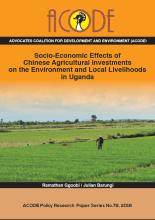Land Library
Welcome to the Land Portal Library. Explore our vast collection of open-access resources (over 74,000) including reports, journal articles, research papers, peer-reviewed publications, legal documents, videos and much more.
/ library resources
Showing items 1 through 9 of 45.The need to establish the link between land tenure and food security is increasingly gaining currency as governments and development organizations refocus their effort towards assisting farmers to move away from subsistence farming to commercial agriculture.
The Ghana Africa Research in Sustainable Intensification for the Next Generation (Africa RISING) Baseline Evaluation Survey (GARBES) survey was implemented from May to July 2014 as part of IFPRI’s Monitoring and Evaluation (M&E) of Africa RISING.
Private sector agricultural extension has expanded rapidly in many developing countries in the wake of drastic funding cuts made to public extension systems in the 1980s and 1990s.
The Mali Africa Research in Sustainable Intensification for the Next Generation (Africa RISING) Baseline Evaluation Survey (MARBES) survey was implemented during May-July 2014 as part of IFPRI’s Monitoring and Evaluation (M&E) of Africa RISING.
The Tanzania Africa Research in Sustainable Intensification for the Next Generation (Africa RISING) Baseline Evaluation Survey (TARBES) was implemented during February-April 2014 as part of the International Food Policy Research Institute’s Monitoring and Evaluation (M&E) of Africa RISING.
The nature and significance of China's engagements with African agriculture continues to be hotly debated in the media, academia and policy circles around the world.
Equitable access to land is vital for inclusive economic growth, sustainable development and food security. Although much is known about the topics of land governance and food security, it is not always clear how the two relate to each other, especially in specific country contexts.
Food security in Uganda relies mainly on access to land and security of tenure. Land governance is marked by the contradiction between relatively progressive legislation and only partial implementation.







